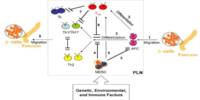A study performed by the University of Southampton discovered that pharmaceuticals play an essential role in enhancing the quality of life of persons with ADHD, but the authors propose that further support, in addition to medications, is required.
The findings, published online in The Journal of the American Academy of Child and Adolescent Psychiatry, highlight the potential impact of shortages of specific ADHD drugs.
“It is deeply concerning to consider the impact on people who are unable to access their medication due to supply shortages or other reasons,” says Professor Samuele Cortese of the University of Southampton, the paper’s senior author.
Attention-Deficit/Hyperactivity Disorder (ADHD) is primarily characterised by inattention, hyperactivity, and impulsivity. These core symptoms can negatively impact social interactions and relationships, work, education, and the ability to perform daily tasks.
People with ADHD report lower quality of life in areas such as work productivity, social and family life, and self-esteem, compared to their neurotypical peers. This study shows that medications play an important role in improving quality of life for those with the condition.
Dr Alessio Bellato
“People with ADHD report lower quality of life in areas such as work productivity, social and family life, and self-esteem, compared to their neurotypical peers,” says Dr Alessio Bellato, a lecturer in Psychology at the University of Southampton and lead author of the paper.
“This study shows that medications play an important role in improving quality of life for those with the condition.”
The researchers conducted the first systematic review and meta-analysis of the effects of stimulant (amphetamines and methylphenidate) and non-stimulant (atomoxetine) ADHD medications on quality of life.
They included 17 placebo-controlled trials with almost 5,000 participants in the study. The trials were chosen from the MED-ADHD dataset, which is the largest dataset of ADHD drug trials created by Professor Cortese and worldwide collaborators.

Both stimulant and non-stimulant medications dramatically improved quality of life compared to placebo. However, the study discovered that, while the benefits of these medicines on core ADHD symptoms are often medium to high, the impact on quality of life is minimal to moderate.
A co-author, Professor David Coghill of the University of Melbourne, noted, “This disparity shows that, for most people, targeting core symptoms through medication alone is unlikely to be enough to counteract the impact of ADHD on quality of life.” More research is needed to determine whether combining medication with other ways can lead to additional increases in well-being, as well as what sorts of assistance may be most beneficial in instances where medication is unavailable.
“More research is also needed to better understand how these medications affect quality of life,” says Dr Bellato. “It could be that reducing the core symptoms of ADHD (inattention, hyperactivity, impulsivity) leads to more efficient task management and this results in better academic and professional outcomes. Medications may also help to stabilise emotional dysregulation, which might promote emotional well-being and higher self-esteem.”
“Considering that ADHD medication might not be acceptable, effective, or well tolerated for everyone with ADHD, more research is needed to evaluate alternative approaches, including psychological interventions.”
















